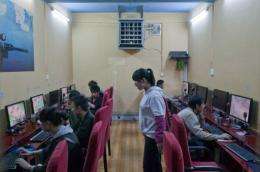US Internet censorship fight falling short: report

State Department efforts to combat Internet censorship in China and other countries have fallen short and funding for the drive should be shifted to another US agency, a Senate committee report says.
The Senate Foreign Relations Committee report sharply criticizes the State Department for being slow in spending money allocated by Congress for Internet Censorship Circumvention Technology (ICCT).
The report, a copy of which was obtained by AFP, recommends that the funding be given instead to the Broadcasting Board of Governors (BBG), which oversees the Voice of America, Radio Free Asia and other US radio and TV networks.
The report is to be released on Tuesday, the same day Secretary of State Hillary Clinton is scheduled to deliver remarks on Internet freedom at George Washington University here.
Clinton also delivered a major Internet freedom speech in January 2010, but the Senate committee report said there had been "scant follow-up" in the next 12 months.
Congress has given the State Department $50 million for Internet freedom programs since fiscal 2008, the report said, but $30 million remains unspent and little has gone to Internet Censorship Circumvention Technology.
"Such technology should be given a much higher priority by the US government," it said. "US government support for ICCT development is vital, given the weak private sector market interest in funding such technologies."
The report suggested the delays in allocating funding were partly because some of the most sophisticated ICCT software -- DIT and UltraReach -- was developed by two US companies founded by members of the Falungong, which is banned in China, to allow followers to break through the "Great Firewall."
The report said DIT and UltraReach have been used to circumvent Internet censorship in Iran, Saudi Arabia, Syria, Egypt, Myanmar and Vietnam -- "countries which have looked to China for lessons in Internet control or to whom China has directly provided technologies to counter such products."
It said the delays in allocating funding have "strengthened the hands of those governments, including China's, who seek to restrict their citizens' access to information."
"The State Department is poorly placed to handle this issue due to its reliance on daily bilateral interaction with these very same governments, particularly China," the report said.
It said BBG stations, which also include Radio Marti, which targets Cuba, and the Middle East Broadcasting Network "must all work on a daily basis to ensure their radio, Internet and television programs are being received by audiences in certain countries that try to block, jam or outlaw these efforts."
"As such, the BBG, and not the State Department, would appear to be the logical lead agency in the federal government to focus current and future ICCT funding," the report said.
The report also criticized what it called the "inept handling of an untested technology" -- ICCT software called Haystack created by the San Francisco-based Censorship Research Center to assist Iranian democracy activists.
"The Haystack team had not sufficiently tested its software nor allowed it to be submitted for independent cryptological analysis before it released a beta version to unsuspecting Iranians," the report said.
"In September 2010, just after the beta version was released, an independent team was able to crack the code in six hours and also determined that the Iranian government would be able to manipulate the software to identify any users," it said. "Once these weaknesses were made public, the Haystack project quickly collapsed."
The report, which also called for the US government to increase its public diplomacy efforts to counter China's "vigorous" moves on the outreach front, was prepared at the request of Senator Richard Lugar of Indiana, the top-ranking Republican on the Senate Foreign Relations Committee.
(c) 2011 AFP

















